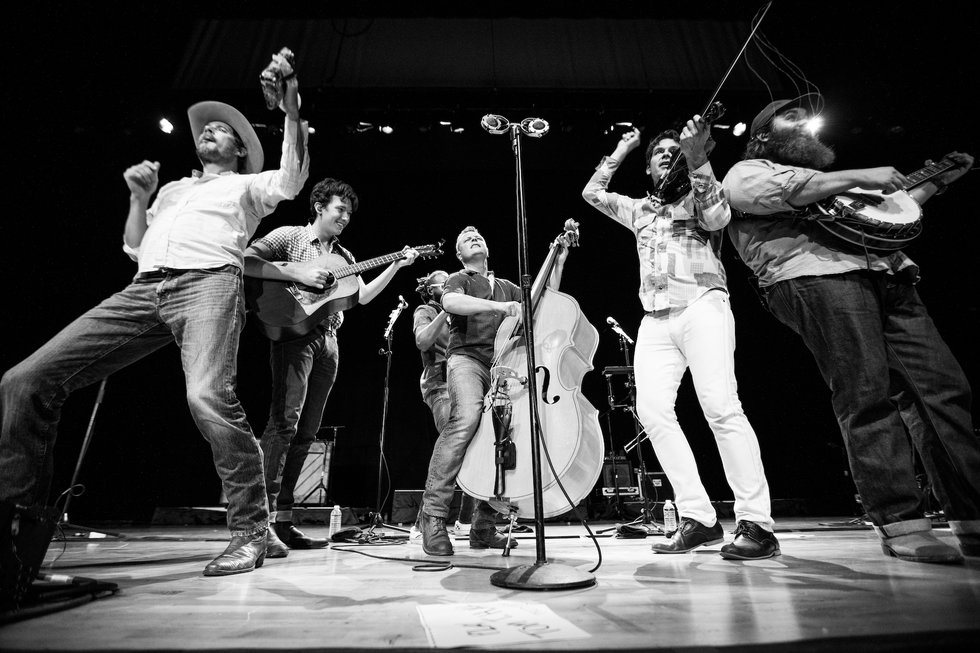Why can’t Sons of Bill just stay the way they are?

The Sons of Bill, from left: Todd Wellons, Sam Wilson, James Wilson, Seth Green and Abe Wilson.
The Sons of Bill did what they always do when it came time to record their most recent album, “Love & Logic,” which was released in late September: They took everything that had worked on the three albums before it and cast it all aside.
In its place, they tried new approaches to writing, new instrumentation and, as has also become habit, a new producer. “It’s all about making records where you are right now,” says James Wilson, one of three Wilson brothers, plus two friends, who make up the Charlottesville band. “That’s what I love about this band: We’re all willing to grow.”
Eight years ago, James and his brothers Sam and Abe, plus Seth Green and Todd Wellons, came together and formed the kind of band that could have carved out a long career on the fraternity party circuit. Their first album, “A Far Cry From Freedom,” produced a mix of weepy country and amped up rock songs that fans still call for every time the band takes the stage.
Songs like “Texas,” a rocker with brash lyrics that established the band as Virginia’s, and the easy-feeling “Roll on Jordan” helped the band attract, and keep, a steady following in its early years. But the band was never content being content.
The guys began rearranging songs, then they began writing the kinds of songs bands like the 2006 version of themselves never could have imagined. “This is like Sons of Bill 2.0,” says Sam Wilson. “It’s still us, but we’re at the next level.”
Pushing the band to that level has been a progression of name-brand talent: Grammy Award-winning producer and engineer Jim Scott, who produced the band’s second album in Los Angeles; David Lowery, frontman of the ’90s’ alt rock band Cracker, who was at the helm for the third in his Richmond studio; and former Uncle Tupelo and Wilco drummer Ken Coomer, who produced the fourth in Nashville.
“We tried to self-produce [Love & Logic] for about a month, but it didn’t go well,” says James. “We could only get the songs to be good,” says Sam. “We couldn’t get them to be great.”
“The problem with five people trying to offer creative input is, we really needed one person to say, ‘Try it this way,’” says Abe Wilson. “We could have put something together, but it wouldn’t have been as good as we wanted it to be.”
A friend of a friend connected James, who’d left Charlottesville for Nashville to clear his head in the spring, with Coomer, who listened to an early recording of the song “Bad Dancer,” a catchy coming-of-age pop song the band had been playing on the road the past two years. Then the two spent time talking: “He said, ‘I don’t think you’ve made the record you’re capable of making,’” James says.
For a band that’s serious about its music, it could have been a crushing blow.
But two records ago, they went to L.A. to work with Scott, who had worked on dozens of albums the band long counted as influences—including titles from Tom Petty, Wilco and Lucinda Williams, among others—and he was even more brutal. They finagled a week of Scott’s schedule, flew to the West Coast and set up to cut an album.
After a couple of songs, Scott stopped them. “He said, ‘Did you guys come all the way out here to suck this much?’” James says.
As they did then, the band took the criticism in stride this year and used it as inspiration to push harder in the studio. “I think what I’ve learned is that you can try to have such a death grip over your art, your career, your life,” says James. “There’s a fear that everyone is out to destroy [it]. The lesson, and it was hard to learn, is to learn to trust yourself. On ‘Love & Logic,’ this was just all of us really letting go, pouring our hearts and souls and love into it,” he explains.
Coomer calls the output a “career record,” and says, “It might not be the record you put on and listen to the three radio songs and the rest is manila-vanilla filler. This is like making a vinyl record, that philosophy: ‘This is the beginning of side two’ …. They rose to the occasion. I’ll hear people who say ‘That’s good enough,’ and I hate that. Good enough? This is your art. This is what you’re known for. You’ve got to care about it.”
James says caring was never the problem. The only concern was making an album true to the band. “I like to think it’s a hopeful record … Sometimes hopeful is looking at things for what they are.” SonsOfBill.com









